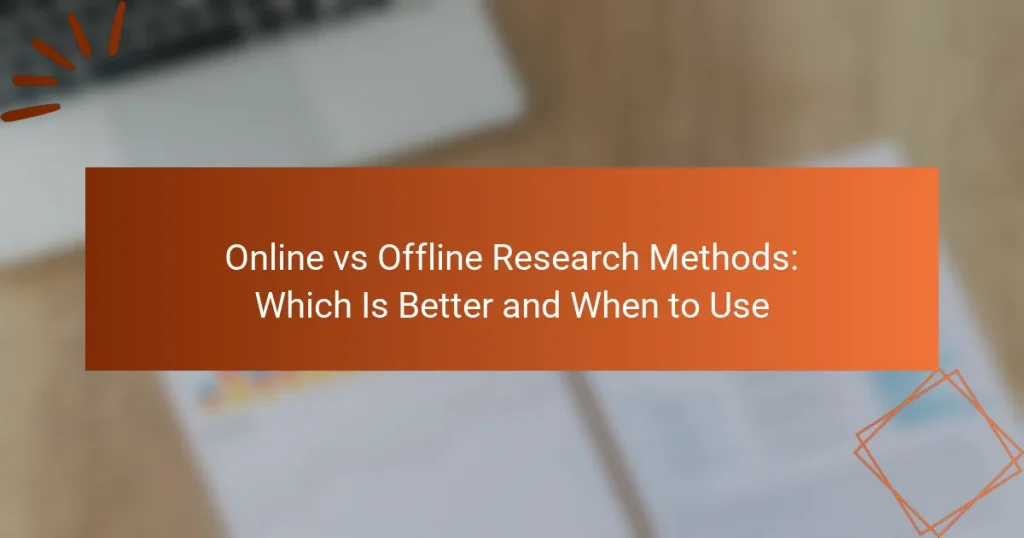In today’s digital age, researchers often face the dilemma of choosing between online and offline research methods. While online methods provide quick access to vast amounts of information and cost-effective data collection, offline approaches excel in gathering rich qualitative insights and maintaining control over the research process. Understanding the strengths and appropriate contexts for each method is essential for effective research outcomes.

What are the advantages of online research methods?
Online research methods offer significant advantages such as accessibility, a wealth of information, cost savings, and the ability to receive real-time updates. These benefits make online research a preferred choice for many individuals and organizations seeking efficient data collection and analysis.
Accessibility and convenience
Online research methods are highly accessible, allowing users to gather information from anywhere with an internet connection. This convenience means that researchers can work from home, in cafes, or while traveling, eliminating the need for physical presence in libraries or archives.
Moreover, online platforms are available 24/7, enabling researchers to access data at their convenience, which is particularly beneficial for those with busy schedules or time zone differences.
Access to a vast amount of information
The internet provides access to an immense range of information, including academic journals, articles, databases, and multimedia resources. This vast pool of knowledge allows researchers to explore diverse perspectives and gather comprehensive data on their topics of interest.
Additionally, online research can include user-generated content, such as forums and social media, which can provide real-time insights and trends that may not be available through traditional sources.
Cost-effectiveness
Conducting research online is often more cost-effective than offline methods. Many online resources are free or available at a lower cost compared to purchasing books or accessing paid databases in physical libraries.
Furthermore, the reduction in travel expenses and time associated with offline research can lead to significant savings, making online methods an attractive option for budget-conscious researchers.
Real-time updates
Online research methods allow for real-time updates, ensuring that researchers have access to the most current information available. This is particularly important in fast-paced fields such as technology, health, and social sciences, where data can change rapidly.
Researchers can subscribe to alerts or follow specific websites and databases to receive notifications about new publications or updates, ensuring their work remains relevant and informed by the latest findings.

What are the advantages of offline research methods?
Offline research methods offer several advantages, including the ability to gather rich, qualitative data and maintain control over the data collection process. These methods can also help mitigate information overload by focusing on specific, relevant insights.
In-depth qualitative insights
Offline research methods, such as interviews and focus groups, provide opportunities for in-depth qualitative insights. These approaches allow researchers to explore participants’ thoughts, feelings, and motivations in detail, which can lead to a deeper understanding of complex issues.
For example, conducting a series of face-to-face interviews can reveal nuanced perspectives that might be overlooked in online surveys. This depth of information is particularly valuable when exploring sensitive topics or gathering feedback on new products.
Control over data collection
One significant advantage of offline research is the control it offers over the data collection process. Researchers can select specific environments, manage participant interactions, and ensure that the data is collected consistently and accurately.
This control can be crucial when working with vulnerable populations or when the research requires a specific setting, such as a controlled focus group environment. Additionally, researchers can adjust their methods in real-time based on participant responses, enhancing the quality of the data collected.
Reduced information overload
Offline research methods can help reduce information overload by focusing on targeted questions and discussions. Unlike online research, where participants may be bombarded with numerous questions or options, offline methods can streamline the process.
For instance, a well-structured interview can limit the scope of responses, allowing researchers to concentrate on key themes without overwhelming participants. This focused approach can lead to clearer insights and more actionable findings.

When should I use online research methods?
Online research methods are best utilized when you need quick access to a wide range of data or insights. They are particularly effective for gathering information from diverse sources, making them ideal for various research scenarios.
For broad market analysis
Online research is highly effective for broad market analysis due to its ability to aggregate large amounts of data from multiple sources. Tools like surveys, social media analytics, and web scraping can provide insights into consumer behavior and market trends. For instance, using platforms like Google Trends can help identify popular topics and search behaviors in real time.
Consider leveraging online databases and industry reports to enhance your analysis. These resources often provide valuable statistics and insights that can inform your understanding of market dynamics. However, ensure the credibility of your sources to avoid misinformation.
When speed is essential
Online research methods excel when speed is crucial, as they allow for rapid data collection and analysis. Surveys can be distributed and completed within hours, while social media can provide immediate feedback on products or services. This quick turnaround is vital in fast-paced environments like tech and marketing.
To maximize efficiency, use online tools that automate data collection and analysis. For example, platforms like SurveyMonkey or Google Forms can streamline survey distribution and results compilation. However, be cautious of potential biases in quick responses, as they may not always represent the broader population accurately.
For digital product testing
Online research is particularly useful for digital product testing, enabling real-time feedback from users. Methods such as A/B testing, usability testing, and online focus groups can help identify user preferences and pain points. This feedback can be gathered quickly and at a lower cost compared to traditional methods.
When conducting online product tests, ensure you have a clear set of metrics to evaluate performance. Tools like Hotjar or Google Analytics can provide insights into user interactions and behaviors. Additionally, be mindful of the demographic diversity of your testers to ensure the feedback is representative of your target audience.

When should I use offline research methods?
Offline research methods are best utilized when in-depth understanding and personal interaction are essential. These methods often yield richer insights, especially in contexts where digital access is limited or when the subject matter is sensitive.
For detailed user interviews
Conducting detailed user interviews offline allows for a more personal connection, fostering trust and openness. In-person interactions can lead to deeper insights as non-verbal cues and emotional responses are more easily observed.
Consider scheduling interviews in comfortable settings that encourage candid conversation. Aim for sessions lasting between 30 minutes to an hour to allow for thorough exploration of topics.
When exploring sensitive topics
Offline research is particularly effective for sensitive topics where participants may feel uncomfortable discussing issues in a digital format. The privacy and confidentiality of face-to-face interactions can help participants feel safer sharing personal experiences.
To facilitate these discussions, ensure a respectful and empathetic environment. It may be beneficial to conduct these interviews in private spaces, away from distractions, to promote openness.
For observational studies
Observational studies conducted offline provide the opportunity to gather data in natural settings, allowing researchers to see real-life behaviors and interactions. This method is particularly useful in environments where online behavior may not accurately reflect true actions.
When planning observational studies, define clear objectives and focus on specific behaviors to monitor. Collect data over several sessions to identify patterns and trends, ensuring a comprehensive understanding of the subject matter.

How do online and offline methods compare?
Online and offline research methods each have unique advantages and limitations. Online methods are typically faster and more cost-effective, while offline methods can provide deeper insights through direct interaction.
Cost comparison
Online research methods generally incur lower costs compared to offline methods. For instance, conducting surveys via email or social media can be done for minimal expenses, often under a few hundred USD. In contrast, offline methods like focus groups or in-person interviews can range from several hundred to thousands of USD, depending on logistics and participant compensation.
When budgeting for research, consider not only the direct costs but also the time involved. Online methods can yield quicker results, potentially reducing labor costs associated with data collection and analysis.
Data reliability
Data reliability can vary significantly between online and offline methods. Online data may be influenced by self-selection bias, as participants choose to engage, which can skew results. Offline methods, such as face-to-face interviews, often allow for more nuanced responses and can build trust, leading to more reliable data.
To enhance reliability in online research, use verified platforms and ensure a diverse participant pool. For offline methods, consider employing trained moderators to facilitate discussions and minimize bias.
Sample diversity
Sample diversity is often broader in online research due to the ability to reach a global audience. This can be particularly beneficial for studies requiring input from varied demographics. However, it may lack representation from certain groups who are less active online.
Offline methods can provide targeted insights from specific populations, such as local communities or niche markets. Combining both approaches can help achieve a well-rounded sample, capturing both the breadth of online diversity and the depth of offline engagement.


